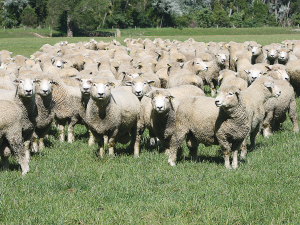A research project breeding sheep which emit less methane, with the potential to reduce methane emissions if these sheep can be farmed throughout New Zealand, has picked up a prestigious award.
The AgResearch team behind the project was recently award the Royal Society’s Pickering Medal, which is awarded for innovative technology that has generated significant impact or commercial success.
Key contributors to the research are Dr Suzanne Rowe, Dr John McEwan, Dr Peter Janssen, and Dr Graeme Atwood. Rowe leads the programme, with key expertise from McEwan on animal genetics and genomics, with Janssen and Atwood on the rumen microbiome and methane production.
Low methane sheep provides farmers with a practical tool to help them lower emissions from their flocks. It also offers the world a scientific solution to reducing agricultural contributions to global greenhouse gases.
The AgResearch team first developed technology and scientific protocols to effectively measure the gas output of individual animals. It then identified genetic and microbiological markers of low methane production.
For more than a decade they have used this information to select healthy sheep which not only emit less methane, but also produce high-quality meat and wool. AgResearch has worked closely with the sheep-farming industry to implement the breeding approach more widely.
The project has been a global first for any species, with the opportunity to reproduce the success of the programme for other livestock and accelerate global efforts to mitigate anthropogenic climate change.
Several mitigation strategies for livestock are currently being explored to meet New Zealand’s greenhouse gas emissions target of 24-47% less methane, below 2017 levels, by 2050. Of the various approaches, breeding of lower methane-emitting ruminants has the advantage of being permanent and cumulative.
This research has shown that after only three generations of breeding, the sheep bred to emit the least methane produce close to 13% less methane than the highest emitters per kilogram of feed eaten.
AgResearch’s elite “research flock 2638” has been developed over three decades from sheep representative of New Zealand’s national flock to cumulatively enhance specific traits.
In 2021, the research team recorded a drop of over 2% in methane emissions from flock 2638, while continuing to improve performance in other traits that are relevant to industry, such as the quality of meat and wool.
The researchers estimate that incorporation of this low-methane breeding trait into New Zealand’s entire sheep flock would reduce methane by 0.5 to 1% annually, with ongoing reductions from further breeding.
The low-methane breeding research is supported with funding from farmers through the Pastoral Greenhouse Gas Research Consortium, and from the government via the New Zealand Agricultural Greenhouse Gas Research Centre. AgResearch says it has also worked closely with Beef + Lamb New Zealand on engagement with farmers and plans to scale-up this technology.



















